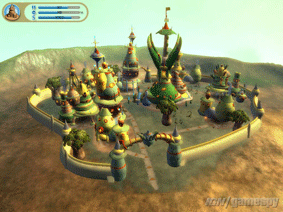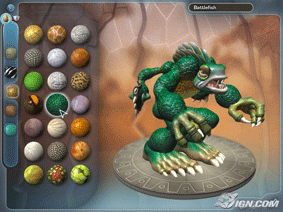More research
Things seem to be hotting up in the computer game world, with the X-box 360 out a while ago, and both Sony and Nintendo lining up their new products for releas later this year. There's a lot of talk about new directions for games. Will Wright (inventor of the Sims games) is soon to release a new game, called Spore. (Video demo here). One of the main things he learnt from Sims is that people like to make their own content, which is exactly what Spore does, as explained in my last blog. At the same time, Nintendo are soon to release what they are now calling the Wii (no longer Revolution), with the controller that has a motion sensor. This has been demonstrated at E3 today, with a version of tennis that involves real arm movements. Kind of active interactive! And you don't have to keep collecting the ball from the net. The BBC's report is here.
Sony's PS3 also apparently has a motion sensor of sorts - you can tilt a plane by tilting the controller for example. GameSpy don't feel the PS3 is as innovative as the Wii, but it's quite likely they both have other things up their sleeves, and E3 is presumably a way of testing responses for new products with plenty of time to make changes before release.
These are clearly the two directions that innovations for games are moving in - user created content, and innovations in controllers. I imagine with Spore that although the player can create their own creatures, the look and style of the world is defined by the designer. In the real world, of course, buildings are made with different materials in different parts of the world. It's not clear yet from what I can see whether there will be the possibility for this difference in Spore. That said, you would probably expect a consistent look in a computer game. Although here it is described as being more of a toy that you play with, creating things, than a typical game.

This article is about the research and prototypig of a game like Spore. Like a major film, it takes lots of people, lots of time with lots of money. The prototyping of small parts at a time allows you to find out what works and what doesn't - they test

Overall, then, it's important to try lots of small bits out, get feedback; improve, change, disgard as appropriate, and kind of allow an organic process to evolve into a finished product.

There is also an overview of Will Wright's keynote speech at the GDC, where he talks about his view on research. Reading, talking, surfing the web is perhaps fairly obvious. He uses the metaphor of a tree to describe, with ideas and decisions being the branches, twigs and leaves. The big decisions, necessarily come early, and thus the trunk. He also talks about the level of realism within a game. A lot of his research is into how things work, but then uses fiction to make the game playable. I guess this is how some of the best novels work. (I'm thinking in particular of Neal Stephenson's rather wonderful Baroque Cycle, which I recently read. The mix of a wide sweep of real historical 17th and 18th century figures and ficional ones is quite staggering at times.) It's the fictional element and being able to do things that you can't in the real world, that usually makes games fun and compelling. Whilst the fact stuff can be interesting enough so that you learn things while you play, and possibly generate the desire to find out more.

Wright also talks about the need for trialling lots of prototypes (as above), and then about the need for 'hooks' for each level, to give the sense of progress and change having been brought about by the player, presumably. And the process of deconstruction, in researching how things work in the real world, and reconstruction, in recreating these things in the game world. But it's the idea of players being inspired to think ,or learn, about about a subject that he keeps coming back to, and I'm not sure that an 'author's' intentions can ever be fully realised (if at all), particularly in such a game. Although it does, apparently, give you a reasonable feel of how large and diverse the cosmos is. It's interesting that he sees what he does as something of a mission in that he tells his audience: "Change your players!" (And he doesn't mean swap them for different ones!) He is clearly deeply interested and inspired by the content of the game, however, that perhaps he just wants to share this.

Sony's PS3 also apparently has a motion sensor of sorts - you can tilt a plane by tilting the controller for example. GameSpy don't feel the PS3 is as innovative as the Wii, but it's quite likely they both have other things up their sleeves, and E3 is presumably a way of testing responses for new products with plenty of time to make changes before release.
These are clearly the two directions that innovations for games are moving in - user created content, and innovations in controllers. I imagine with Spore that although the player can create their own creatures, the look and style of the world is defined by the designer. In the real world, of course, buildings are made with different materials in different parts of the world. It's not clear yet from what I can see whether there will be the possibility for this difference in Spore. That said, you would probably expect a consistent look in a computer game. Although here it is described as being more of a toy that you play with, creating things, than a typical game.

This article is about the research and prototypig of a game like Spore. Like a major film, it takes lots of people, lots of time with lots of money. The prototyping of small parts at a time allows you to find out what works and what doesn't - they test
solutions that people think might work. They can also, of course lead the designer in new directions. A good prototype
should be fast, cheap, relevant, applicable, and focused!Using something that already exists to test ideas on makes it simpler and quicker, and cheaper. And it's suggested that you try the riskiest ideas first rather than spend lots of time on other parts surrounding them. The whole thing has to work as a whole, of course. Even if the different parts work, they have to all fit together.

Overall, then, it's important to try lots of small bits out, get feedback; improve, change, disgard as appropriate, and kind of allow an organic process to evolve into a finished product.

There is also an overview of Will Wright's keynote speech at the GDC, where he talks about his view on research. Reading, talking, surfing the web is perhaps fairly obvious. He uses the metaphor of a tree to describe, with ideas and decisions being the branches, twigs and leaves. The big decisions, necessarily come early, and thus the trunk. He also talks about the level of realism within a game. A lot of his research is into how things work, but then uses fiction to make the game playable. I guess this is how some of the best novels work. (I'm thinking in particular of Neal Stephenson's rather wonderful Baroque Cycle, which I recently read. The mix of a wide sweep of real historical 17th and 18th century figures and ficional ones is quite staggering at times.) It's the fictional element and being able to do things that you can't in the real world, that usually makes games fun and compelling. Whilst the fact stuff can be interesting enough so that you learn things while you play, and possibly generate the desire to find out more.

Wright also talks about the need for trialling lots of prototypes (as above), and then about the need for 'hooks' for each level, to give the sense of progress and change having been brought about by the player, presumably. And the process of deconstruction, in researching how things work in the real world, and reconstruction, in recreating these things in the game world. But it's the idea of players being inspired to think ,or learn, about about a subject that he keeps coming back to, and I'm not sure that an 'author's' intentions can ever be fully realised (if at all), particularly in such a game. Although it does, apparently, give you a reasonable feel of how large and diverse the cosmos is. It's interesting that he sees what he does as something of a mission in that he tells his audience: "Change your players!" (And he doesn't mean swap them for different ones!) He is clearly deeply interested and inspired by the content of the game, however, that perhaps he just wants to share this.



0 Comments:
Post a Comment
<< Home